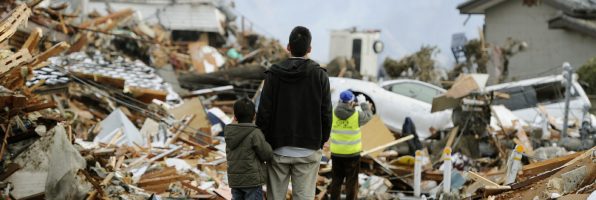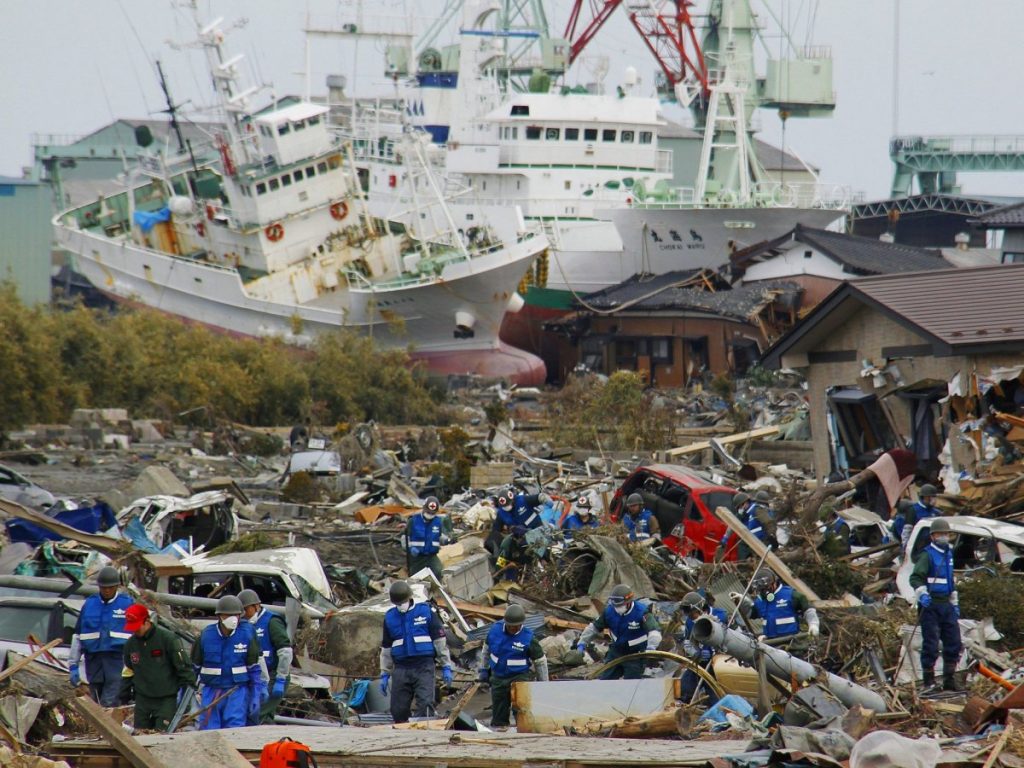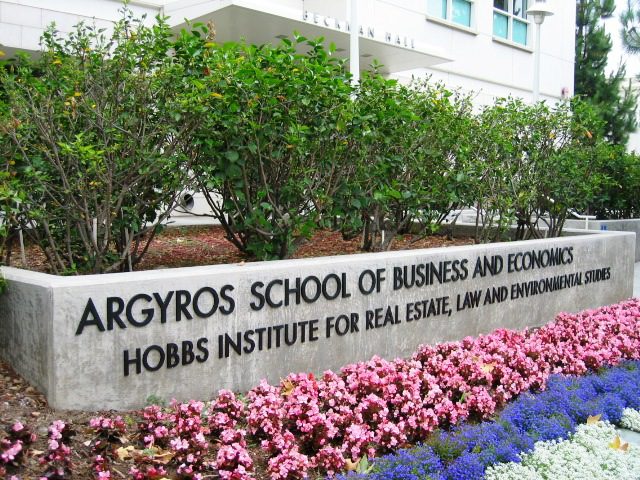How Natural Disasters Can Turn into Economics Disasters – Chicago News

Let’s explore some of the most interesting stories that have emerged from Chicago business schools this week.
Localized Natural Disasters Can Hurt an Entire Country’s Economy – Kellogg Insight
Northwestern Kellogg School of Management associate professor of managerial economics and decision sciences Alireza Tahbaz-Salehi set out to understand the large-scale economic implications of natural disasters.
Tahbaz-Salehi worked with Vasco Carvalho of the University of Cambridge, Makoto Nirei of the Ministry of Finance of Japan, and Yukiko Saito of the Research Institute of Economy, Trade and Industry in Japan. After the 2011 earthquake, “disaster-affected firms’ connections to companies outside the regions affected by the quake had a strong effect: these links accounted for a 1.2 percent decline in Japan’s gross economic output the year after the disaster.”

The aftermath of the 2011 earthquake in Japan hurt economic productivity for a lengthy period of time. Photo via Reuters
Tahbaz-Salehi says, “If these shocks start propagating from a firm to its customers, to its customers’ customers, and so on, they may also have an aggregate effect on the entire economy. But there have been almost no empirical studies to document whether these effects exist and how big they are.”
You can read more from Kellogg Insight here.
Hitting Rock Bottom After Job Loss Can Be Beneficial – Mendoza College of Business
To paraphrase Beckett, “Try, fail, try again, fail again, fail better.” Notre Dame Mendoza College of Business‘ Siegfried professor of entrepreneurship Dean Shepherd recently co-authored a study in Academy of Management Review with Indiana University’s Trenton Williams, which finds that on the road to success, failure is often the most revealing option.
“On the way down, we frantically do all sorts of things to try and repair the situation, and suffer as they fail. Bottoming out frees us from the misconception that the problems can be fixed, and in the process, frees us from other constraints and negative emotions and provides the conditions necessary to find a viable solution.”
He continues:
“‘A failed corporate executive might consider a variety of other potential roles,’ Shepherd says. ‘For example, sitting on the board of a nonprofit organization that is desperate for experienced managerial guidance, exploring government positions or running for office, working with startups, and so forth. Similarly, a failed entrepreneur might explore how skills learned in starting a business could be applied in a corporate setting, take standardized exams to be considered for law school or engage in other low risk exploration activities. In these cases, hitting rock bottom opens up myriad new opportunities.’”
Read more about the duo’s research here.
Would You Pay $20 a Day to Lease a Luxury Car? – Booth School of Business
University of Chicago Booth School of Business associate professor Daniel Bartels and the University of Rhode Island’s Stephen Atlas are scheduled to publish a new study in the Journal of Consumer Research entitled, “Periodic Pricing and Perceived Contract Benefits,” which finds that people “perceive more benefits from their purchases if they make payments on a periodic basis.”

Research from Booth shows that people feel their purchases are more valuable if its paid off in repeated cycles. Photo via NY Auto Show.
“Our framework and results suggest that periodic pricing can help people appreciate the benefits they accrue from a purchase. So, under the right conditions, marketers can encourage purchase with periodic pricing, even for significant sums of money.”
Read more about the duo’s research here.
Misty Johnson Named Business Dean – DePaul Driehaus College of Business and Kellstadt Graduate School of Business
As of March 1, the Driehaus College of Business and Kellstadt Graduate School of Business formally introduced its newest business college dean, Misty Johnson, Ph.D.
Johnson became the interim dean of the business college back in July, replacing former dean Ray Whittington. With her role now official, she has become the first-ever female dean of DePaul’s business school.
“Dr. Johanson has done a laudable job, and I’m pleased the college will continue to benefit from her leadership and expertise,” DePaul University Provost denBoer said in a press release.
“During her tenure this academic year, fall graduate business enrollment increased 16 percent; staff roles were reimagined to enhance the student experience; master’s program and center directors began collaborating more closely to support graduate program success, and the college forged stronger industry connections to support career opportunities. Johanson also launched a campaign with the Office of Advancement to raise $4 million for the college by the end of the academic year and exceeded the goal within the first six months.”
You can read more about the official appointment of Dr. Johnson here.
How Can We Respond To A Crisis Better? An MIT Alum Has a Few Suggestions

In the wake of Hawaii’s false emergency threat last week, MIT Sloan recently discussed the two key lessons that will make countries more “efficient when responding to a crisis.”
Miyamoto International’s Elizabeth Petheo (MBA ’14) whose career has focused on international urban disaster and risk reduction and resiliency programs believes that countries in which disasters occur should drive resiliency efforts, but “international actors can act as a catalyst for knowledge transfer.”
Petheo explains that the national actors “who know the area best, understand what capabilities their community already has, and what needs to be strengthened” are the ones who need to drive the conversation. She advises communities to develop a checklist of sorts and ensure they have firm handles on questions related to the necessary equipment, whether there’s a control structure in place to make decisions, “who else in their ecosystem will be respond to disasters, and how their specific work area impacts other areas.”

Photo via Caleb Jones/AP
Part two of disaster relief involves the perspectives—and efforts—of the international community, which are necessary for communities to “understand links—how different actors who respond in a time of crisis can help and support each other,” according to Petheo.
Miyamoto, for instance, uses data to “help local first responders understand what different scenarios would be if an earthquake did strike their area, then help communities identify the gaps in their readiness and what areas could be strengthened.”
“To prepare for a crisis, there are a number of questions that communities can ask themselves. ‘This is not an exhaustive list,’ Petheo said, ‘but there are a couple of different buckets: the logistical and operations side of things; overall administrative management of how things get executed; and the players themselves.'”
Petheo concludes, “There is the economic, societal, social, and individual impact that’s happening all at the same time, which is what makes these kinds of emergencies so complex [but] the more you can think through what possible scenarios would be, what the situation that the community or government face would be, the better they are in coping when a crisis actually happens.”
Check out the recent of MIT’s article on disaster relief here.
Stanford GSB Study Says Fun Helps Dealing With Disaster

Stanford’s Graduate School of Business recently published a behavioral study about how having fun is a simple and surprisingly effective tactic victims use to cope in the aftermath of natural disasters.
Continue reading…
Golden Gate Celebrates 50 Years of Public Administration Program

On August 27, Golden Gate University will celebrate the 50th anniversary of their Public Administration program, according to a press release from the school. The event will feature a panel called “From Katrina to Baltimore: Effectively Responding to Emerging Public Administration Challenges,” which will address the heightened state of racial tensions across the United States and the increasing impact of natural disasters on communities, with a focus on community rebuilding, leadership creation, and preparedness. The panelists include GGU alumni Paul Figueroa, Assistant Chief of the Oakland Police Department, Kerry Jackson, Head of Security at the Alameda-Contra Costa Transit District, and Carlos Sanchez, Lieutenant at San Francisco’s District Attorney Office.
GGU’s Master of Public Administration program started in 1963 and was one of the first of its kind in the Bay area. Since then the program has received commendation from public officials like Diane Feinstein, San Francisco’s mayor for a decade and now a US Senator. GGU launched an Executive Master of Public Administration in 1999 and now includes specializations like Law Enforcement and Security and Judicial Administration.
Joaquin Gonzalez, organizer of the event’s theme and Public Administration Chair and Professor, emphasized the value of a seasoned responder’s wisdom. “A discussion on prevention is necessary as most actions are based on reaction. The panelists are not only GGU alumni but also seasoned first responders. We want to take the lead in educating the minds and hearts of a new generation of law enforcers and security experts. Our role at GGU is to educate leaders who make smart and practical decisions to address real-world challenges,” he said in a press release.
